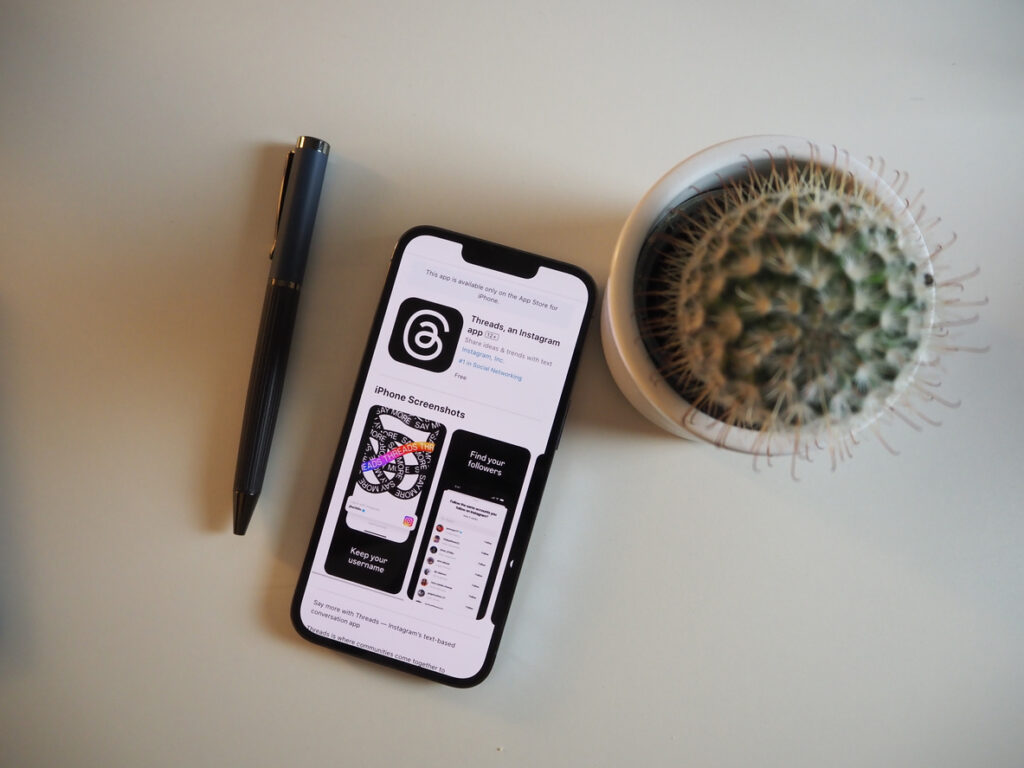A thing about Threads, the new social media tool from Instagram that mimics some of the function of Twitter, is the obvious puns. They’ll leave you in stitches. (Actually, a lot of these are just swiped from sewing puns.)
In January we ran a group post about “Twexit,” asking what the chefs thought about the prospects for Twitter’s community of exchange and information and the existing and emerging alternatives. Were folks leaving, staying, assessing? A full range was reported, along with some perceptive analyses of what Twitter was still doing or not doing, and how its functionality had become baked into a lot of scholarly communications work.
Launched just two weeks ago, Threads became the most rapidly downloaded app and perhaps because it was an outgrowth of Instagram and could instantly port new users from their existing Instagram accounts, seemed to have potential to become the go-to site for text posts. The picture is a lot less rosy now, with users frustrated by the lack of that functionality they prize on Twitter. The head of Instagram says they are working on building out all the features people most want on Threads: “following feed, editing, multiple accounts, post search, hashtags, web presence, like list, translations.”
Other social media options such as Mastodon, Bluesky, Post, or Spoutible all seem to have a niche but not robust following with Mastodon perhaps making the strongest showing among academics, researchers, and journalists. All of these have their own issues with, well, not being Twitter. As Elon Musk announces or promotes more degradation of his site (a rebranding as X is apparently not a joke) will we all eventually have to move off – or is the strength of Twitter for communication such that it will withstand another round of competition?

Haseeb Irfanullah
I didn’t have an Instagram account before 15 July, but I opened one just to join Threads. Why did I do that? I think for two reasons. First, being disappointed with the new Twitter is a big driver of my recent move, feeling like I need to replace the old Twitter in my (professional) life. I explored a couple of other options, but found them too radical for me. I became inclined a little more towards LinkedIn over the past few months. But, when Threads was branded (putting it extremely softly) as an alternative to Twitter, and a huge number of people joined in the very first week (and with a little bit of inspiration from my teenage nephew), I got motivated.
Second, coming from South Asia, we are very much into Facebook, myself included, both professionally and personally. While I started using Rakuten’s Viber before Meta’s WhatsApp, I found the latter much more comfortable, and have been using it widely to communicate with my students, to interact with small professional groups, and even when a new person wants to keep in touch with me. So, when Meta launched Threads, I was encouraged to expand my comfort zone.
Joining is one thing, but building communities on a brand-new social media platform is quite different.
I know, joining is one thing, but building communities on a brand-new social media platform is quite a different endeavor. Hardly anyone I know is on Threads yet or is talking about it. I wonder if I will be patient enough and wait until momentum is gained and some known faces join this virtual space. Will such community development be much faster than that seen by many other social media platforms since the social media landscape has changed over the past two decades? I also wonder, if for me joining Threads is simply a relationship rebound. If I ever find the old Twitter back due to a change in ownership, will I leave Threads?
I know it is too early to say, since Threads is yet to complete its first month, but artificial intelligence (AI) will indeed play a significant role in community development by capitalizing on Meta’s other social media products and their relationships with non-Meta virtual entities. I also believe Threads can give an extra edge to the scholarly community as the former focuses on text, which we all love. Now the question is whether the scholarly publishing industry will embrace the Threads as quickly as possible without much wait and see, or it will keep investing in the networks it has already built on Twitter over the years. To meet its own needs, will the publishing industry be proactive and bold enough to shape Threads at its initial stage? Or will it be reactive and mold itself based on how Threads evolves over the coming months?
Karin Wulf
I do love the Threads puns. For my community of historians, #Twitterstorians took off on Twitter and on Mastodon the #Histodons community is pretty robust, so of course people wanted to know what the Threads analog would be. I offered #SewWhat (the classic history seminar “so what” question about a research project). But who knows what anyone thinks about this or anything else because the structure of Threads is serendipity, not intentionality. Without a distinct feed of people you follow, any community is so disparate as to be non-existent.
The structure of Threads is serendipity, not intentionality.
As I noted in January, I stopped posting on Twitter in the fall. With two friends, I started a Mastodon instance (historians.social), and we get an influx of new accounts every time something weird happens on Twitter. I also started a new Instagram account to share my current research. It was a pretty easy roll over onto Threads, which I find interesting and potentially more like Twitter, but I’m not holding my breath it is anything like a replacement.
Though I still read Twitter maybe once a day, will retweet and reply to things here and there, I don’t post there. I can see that I’m missing some conversations, and I still really regret the loss of what felt like an invaluable space to learn. But I’m also just reading more news direct from news sites, and curating my rss feeds more carefully. I don’t feel like I’m missing out so much as I’m not commenting on what I’m reading and thinking about – or at least not in the way I did when I was a heavy Tweeter. I really appreciate the conversations I have on Mastodon, which are focused and full but more rare. And I like seeing what people are reposting from Instagram onto Threads or what they’re using Threads to share. But it’s not the same — and neither is Twitter the same.
I have started to wonder not only about a better history of the ages of social media, and particularly one that accounts for how news and information and disinformation became so entangled, but also about how that history will map onto our individual career or life stage experiences. Certainly for any individual person navigating scholarly communications right now, getting a sense of the major issues as opposed to the issues of the day requires a different set of tools. And for institutions, communicating in the era of much more disparate social media is ever more challenging and likewise requires much more care. But is this a bad thing overall? Twitter’s convenience has cut both ways.
Todd Carpenter
It seems that finding the right social media account is harder than one might expect. I was fairly early to Twitter and thinking back to those days, it seems to make sense to me now why I feel that way. It takes a long time to build up a network and a culture. In late 2007, Twitter was young enough as a network to not understand even itself or its purpose. With fewer than 100,000 active users in the month after I joined, it was a comparatively small network. Many people were still focused on the “What did you have for lunch” tweets and the service was notoriously spotty, with the “Twitter Fail Whale” a frequent joke. Today, Twitter is rapidly deteriorating both in the quality of the service, the activity of its participants, and the algorithmic diminishment of non-paid accounts. It’s value is rapidly shrinking.
It takes a long time to build up a network and a culture.
While I’m still using Twitter, I’ve tried a few other tools to replace it, including Mastadon and BlueSky. I’ve not tried Threads, since I vehemently object to Facebook and therefore don’t have an Instagram account, to which Threads is attached. Trading one network run by one odious and childlike leader (Musk) for another controlled exclusively by a different but similarly abusive CEO (Zuckerberg) doesn’t seem to me to solve the problem I’m facing with Twitter. Both are strongly in the grips of the “Enshitification” model (albeit at different stages) that Cory Doctorow described earlier this year at the ALA LibLearnX meeting in New Orleans. Threads’ rapid growth is tied to the ability to port one’s social graph to a different service, and less about the strength of the tool itself. Facebook learned this lesson back in 2006 as it opened up to uses outside of it’s initial collegiate market, when it implemented a tool to allow you to import the entirety of your contact list and invite your Rolodex of friends to the service, which exploded its growth. Making the transition easy is a key to growth. However, replicating a social graph doesn’t address the core issues of trust and control over the quality of the experience. I have no more trust in Zuckerberg to provide a quality service than I do Musk. And whatever the experience is today, I have no faith that Meta will not seek to “enshitify” the Threads service once everyone starts using it. I’ll just keep looking around, thanks.
Lisa Janicke Hinchliffe
I mentioned in our last collective reflection on Twexit/Mastodon that I am an early adopter when it comes to social media. True to my past practice I now have accounts on Post, Bluesky, and Threads. I signed up for Threads on the first day it was on offer (after first accidentally downloading a different app also named Threads, which has been forced to add “NOT AFFILIATED W/ THREADS BY INSTAGRAM!” to its description in the Google Play Store in hope of recovering any usability in their app download and install metrics?). I was out with friends for trivia night at a local music dive and one by one we all activated our accounts. We all agreed that Threads had the real chance of being a challenger to Twitter because of the immediacy of populating one’s network by pulling all of one’s contacts from Instagram.
But, no. Threads’ offer of a personal network is just a façade. The stream of posts you see is not that of those with whom you are connected; it is your connections and a seemingly endless offering of personally irrelevant, objectionable, etc. content that is only manageable post-hoc by blocking, muting, or restricting. And, imagine that you saw a thread of interest. Can you search for it? No! If you happen to remember which account posted in the thread, you can search for that account and then scroll through their posts and replies. The option to use #hashtags to code and sort content that is ubiquitous across social media platforms? Also not on offer. Maybe this is all beta in advance of something to come next but I’m pretty much finished with Threads at this point. Except, of course, I’m not because deleting your Threads account will delete your Instagram account, which I’d like to keep (though it too increasingly serves up content from accounts that I am not following and obscuring the content from friends that I most want to see).
Threads’ offer of a personal network is just a façade.
On another note, this past week offered an opportunity from some “anecdata” on the continuing value of my network on Twitter over Mastodon and also how Twexit has created a bit of an unfortunate divide in our networked communications. On July 13 the House Appropriations Committee released the “Commerce, Justice, Science, and Related Agencies Appropriations Bill” that included: “SEC. 552. None of the funds made available by this or any other Act may be used to implement, administer, apply, enforce, or carry out the Office of Science and Technology Policy’s August 25, 2022, Memorandum to Executive Departments and Agencies entitled, ‘‘Ensuring Free, Immediate, and Equitable Access to Federally Funded Research.” By the following Monday, Twitter was a-tweeting with this news and discussion about why this was happening. I did not see this arise on Mastodon and other social media platforms until after SPARC sent out a request for action to their members-only listserv two days later. It is possible that there was discussion on Mastodon that I did not see and it is difficult to investigate given full-text is not searchable on Mastodon; however, I did do a check of a number of OA advocates/supporters of the OSTP memo and those accounts had no posts prior to the SPARC member alert. Now, maybe those who left Twitter are not dissatisfied with this situation; however, for me, the network I curated on Twitter continues to deliver.
Avi Staiman
When I used to hear the word ‘influencer’, my mind immediately jumped to a group of kids eating Tide pods in their garage or a loudmouthed, in your face, populist-type trying to sell you the latest consumer product. Because I wasn’t terribly interested in being influenced, and don’t have time for shenanigans, I tended to scoff at the role and importance of influencers in my intellectual ‘world’.
Until I came across science influencers and I did a 180°.
Due to its global nature, science has always had a significant digital presence (after all, we invented and still use the listserv!) with #AcademicTwitter as a prominent example.
However, the last year has seen a quick rise of important and ‘influential’ influencers who have learned how to successfully employ a variety of social media – in other words, they aren’t Twitter-dependent – to engage with other scientists and raise important issues in ways that previous science communication efforts failed. Most of these influencers are academics themselves who are actively pursuing an academic career or have recently left academia, lending credence to their ideas and advice.
The last year has seen a quick rise of important and ‘influential’ influencers who have learned how to successfully employ a variety of social media – in other words, they aren’t Twitter-dependent
Mushtaq Bilal, a literature post-doc studying Hans Christen Anderson, has nearly 200K followers on Twitter, where he shares tips on simplifying the process of academic writing.
Andy Stapleton, gave up a career researching renewable energy and solar cells to become a Youtube sensation with some videos reaching nearly 1M views.
Faheem Ullah, who is an active professor of computer science and cyber security, has built a following of 75,000 people on Linkedin by posting advice for early career researchers over the weekend. There are also more niche science influencers such as Harvard PhD Kareem Carr who posts on Twitter translate complicated statistics topics into simple and easy to understand viral posts.
These influencers do a phenomenal job breaking science out of the ivory tower and into the public consciousness. In a post-pandemic, scientific-skeptic world, these voices should be promoted and the publishing industry has much to learn from their approach to communication.
The challenge for these influencers will be to see if they end up ‘selling-out’ and promoting external services to monetize their audience. I have already seen influencers promoting author services and AI tools and it isn’t clear or transparent which gigs are paid and how that impacts their opinions on their ideas. It wouldn’t surprise me to see publishers get in on the game and use these influencers as brand ambassadors in the near future.
I’d be curious to hear your thoughts on the role of influencers in science publishing in the comments….
Discussion
3 Thoughts on "Are We Finally Thread(s) Up with Social Media?"
I think publishers have always had an ‘influencer’ strategy – it’s just those influencers were Editorial Boards and star authors whose impact was somewhat harder to track. It’s important for publishers looking to add social media influencer campaigns to their mix to check who is engaging with the accounts (as far as possible). If it’s fellow academics, who are a target for the Publisher, then great. If, however, the majority are people who will never need to do anything with the Publisher because the posts are focused on making science more accessible for non-academics, then perhaps it’s not quite the right fit. As always, message and audience first, the medium will follow.
That is a good point Emma. It could very well be that more local and ‘focused’ influencers with a reputation in the field could have a greater impact than the big names who reach the masses. I wonder whether this is a direction publishers will decide to take. So far I have only seen author services companies dabbling in this kind of promotion.
For me, as an individual, leaving Twitter was a moral necessity, even if that hurt after 15 years. I did not want to put ad revenue into the new guy’s hands. It’s sad to me that organzations and individuals engaged in Holocaust research, for example, are still there in no small part because of inertia. (Occasionally I lurk using nitter dot nl.) Moreover, Twitter’s no longer even an open platform.
Mastodon has been a good thing, though those who migrated don’t always hang around as much, probably because network-building is hard, not to mention low in quick dopamine fixes. I’m ambivalent about Threads because of how bad FB and Insta have become, but I’ll spend a few minutes on it from time to time. Sometimes I think fondly back to blogrolls and blog carnivals, but those don’t scale in the ways we’ve become accustomed to.


